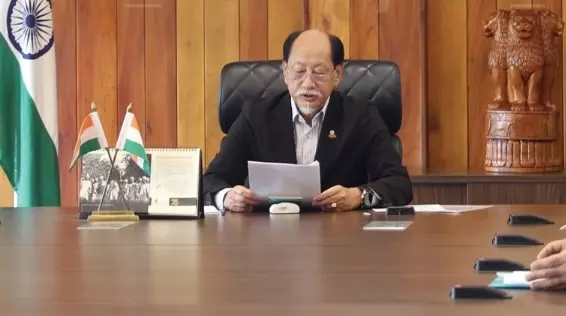
Nagaland govt, Centre at odds over Frontier Nagaland Territory
A state delegation is in New Delhi to discuss a new governance model that would grant special administrative and financial powers to six eastern districts

A new governance model envisaged for the creation of an autonomous territorial region in Nagaland has led to serious differences between the state government and the Centre.
A ministerial delegation of the state, led by Chief Minister Neiphiu Rio, left for New Delhi on Tuesday (August 19) to hold parleys with the Home Ministry representatives to iron out their differences.
They are expected to meet a Home Ministry delegation on Wednesday.
Also read: AFSPA extended in Manipur, parts of Nagaland and Arunachal
What is FNT?
The Home Ministry has agreed in principle to form an autonomous region, the Frontier Nagaland Territory (FNT), comprising six eastern districts of the state to address development imbalance.
The districts are Kiphire, Longleng, Mon, Noklak, Shamator, and Tuensang. They are home to seven Naga tribes: Konyak, Chang, Sangtam Khiamniungan, Tikhir, Phom and Yimkhiung. Collectively, these tribes account for over 30 per cent of Nagaland’s total population and 20 of the 60 assembly seats.
The Eastern Nagaland People’s Organisation (ENPO) – an umbrella body of all tribal organisations of the districts – is pushing for a separate administrative region for the six districts.
Voter turnout was nearly zero in the six districts during the last Lok Sabha elections, following ENPO’s call for a polling boycott to press its demand for statehood.
Rejecting the statehood demand, the Centre agreed to empower the region with a special governance framework.
Also read: Naga conflict: NSCN-IM warns of 'armed conflict'
Centre's proposal irks state govt
All the key stakeholders – the Centre, the Nagaland government and the ENPO – remain officially tight-lipped about the proposed blueprint. However, it is reliably learnt that unlike the existing 10 district councils established under the Sixth Schedule of the Constitution in tribal regions of Assam, Meghalaya, Mizoram and Tripura, the proposed FNT is envisioned as a more empowered and distinct administrative arrangement.
The Centre is contemplating either adding a new clause to the Article 371A that grants Nagaland special safeguards over its land, customs, and resources or enacting a separate law to give the legal and administrative heft to the proposed body, sources told The Federal.
The proposal has irked the state government, which is opposed to granting FNT a separate constitutional identity.
“Such a provision would mean a territorial bifurcation of the state,” claimed Nagaland government’s Parliamentary Affairs minister and spokesperson K G Kenye.
The Nagaland government, in the past, made it clear to the Centre that it is not against granting meaningful autonomy for the state’s relatively underdeveloped eastern region but the autonomy should be within the state’s existing constitutional and territorial fold.
Also read: Nagas grow impatient as Manipur pushes peace issue out of Centre’s priority list
Direct funding
According to the Centre’s current plan, the FNT would not redraw the state’s territorial boundary. Instead, it would function as a separate administrative zone with its own governance system. It will be governed by a special administrator and have a separate secretariat in one of the eastern districts. Departments like health, education, and rural development will be under the new authority.
More importantly, the proposed authority will receive direct funding from the Centre, bypassing the state government. Sources familiar with the development say the financial aspect is the most contentious issue in the proposed framework as it could risk undermining the state’s fiscal sovereignty.
Funds to the existing autonomous councils under the Sixth Schedule are routed through the state government, an arrangement often being seen as bottlenecks in ushering development in the autonomous region. State governments are often accused of diverting or delaying release of funds meant for the councils.
The 125th Amendment Bill, introduced in the Rajya Sabha in 2019 to amend Article 280 and the Sixth Schedule, proposed direct funding to autonomous district councils similar to the existing arrangements for panchayats and municipalities. But the Parliamentary Standing Committee on Home Affairs to which the Bill was sent for examination raised concerns about the direct funding bypassing the state.
Tensions over job reservation
The Nagaland government is also concerned about the likely implications of granting special powers to a specific region on the rest of the state.
Tensions are already simmering over job reservation benefits granted to backward tribes. Apex bodies of five relatively advanced tribes are boycotting state government events and programmes demanding a review of the job reservation policy, which allocates 37 per cent of government jobs to 11 recognised backward tribes. Of this, 25 per cent is reserved for seven tribes from the proposed FNT region.
The state government on Monday constituted a commission to review the 48-year-old reservation policy.

